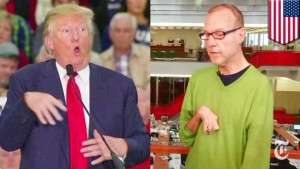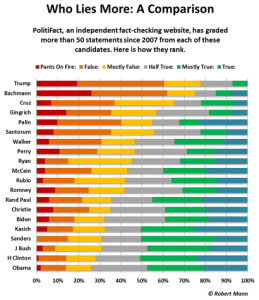Are we fascists? This seems like a simple question, and one that can be answered easily. “Of course not!” you think. However, humor me by considering what defines fascism and fascist movements, and where we, as a country, fit within these definitions.
In 1995, Italian intellectual Eco Umberto, who grew up in Mussolini’s Italy, wrote about the “14 Features of Ur-Fascism” in a lengthy essay in the New York Review of Books. In 2003, amateur historian Laurence Britt took Umberto’s highly philosophical (and sometimes dense) rules and built a similar but more succinct taxonomy that captured many of the same concepts by which Fascism is characterized. The Encyclopaedia Britannicaarticulated many of these same ideas, but at a finer, disaggregated level.
This article looks at an aggregation of all the hallmarks of fascism presented by these three relatively disparate yet congruent sources, and considers whether “Trumpism” meets these 25 individual criteria.
1. Powerful and Continuing Nationalism
“Make America Great Again,” was Trump’s campaign slogan from beginning to end, and immensely popular. It is also intensely and undeniably nationalistic. This is a definitive yes.
2. Right-leaning movement
Though Trump drew a few disaffected Sanders supporters, his movement was overwhelmingly based on Tea Party political views and attitudes. Trump’s support base overwhelmingly self-identified as conservative. This criteria is met.
3. Opposed to political and cultural liberalism
Trumpism roundly rejects and mocks “political correctness.” Their definition of political correctness is essentially that they could not care less if they offend or say horrific things about groups of people, whether it be Mexicans, Muslims, immigrants, Jews, or transgender people. They do not see value in a diverse or pluralistic society, and believe that we’d all be better off if people had only one identity: American. This is a fundamental impossibility of course, when Trumpism singles out anyone who is different for potential abuse.
4. Disdain for the Recognition of Human Rights
Trump at various times has suggested banning Muslims from the country, Muslim registries, waterboarding prisoners (and worse), and deliberately targeting the families of Islamic extremists with airstrikes. He has also vowed to repeal all of President Obama’s executive orders on day one of his Presidency, including those which protect LGBT federal employees and contractors. He has backed stop and frisk, which was found unconstitutional (and ineffective) in New York.
5. Identification of Enemies/Scapegoats as a Unifying Cause
Trump singled out two groups in particular as scapegoats: immigrants who steal the jobs of “real Americans”, and Muslims who, if they aren’t terrorists themselves, are probably harboring or sympathizing with them. His most infamous campaign pledges revolved around building a wall (and laughably claiming he’d make Mexico pay for it), banning Muslims, and deporting approximately 11.5 million undocumented people living in the United States. He is at least partially sticking by the latter, claiming that he will immediately begin deporting 2-3 million criminal aliens.
Other groups have been scapegoated as enemies by Trump surrogates. An undertone of anti-Semitism was woven throughout his campaign. Right-wing outlets like Breitbart and The Federalist consistently pointed to transgender people as illustrative of what is wrong with America (and the Democratic party). Not helping the situation was left wing and centrist mass market media outlets seeming to agree in the post-mortem that transgender people are either why Democrats lost, or are what’s wrong with this country.
6. Supremacy of the Military
Fascist governments and movements embody the idea of constantly preparing for war, and a belief that “Nothing has ever been won in history without bloodshed”. Trump has promised to massively increase military spending, regardless of how it balloons the deficit. Trump has shown no compunction against firing military professionals he disagrees with.
It also seems likely that Trump will nominate Retired Marine Corps General Mikle “Mad Dog” Mattis to the position of Secretary of Defense. No modern American general more embodies the Fascist ideal of bloodshed as a solution. Famous quotes by Mattis embodying the idea of war as desirable, and that there isn’t a problem you cannot kill your way out of, include:
- “Find the enemy that wants to end this experiment (in American democracy) and kill every one of them until they’re so sick of the killing that they leave us and our freedoms intact.”
- “You go into Afghanistan, you got guys who slap women around for five years because they didn’t wear a veil. You know, guys like that ain’t got no manhood left anyway. So it’s a hell of a lot of fun to shoot them.”
- “I come in peace. I didn’t bring artillery. But I’m pleading with you, with tears in my eyes: If you fuck with me, I’ll kill you all.”
7. Sexism
Trump has made many sexist comments, the most famous of which is the “grab ‘em by the pussy” confession to sexual assault. At other times he has essentially observed that women have no value unless they’re beautiful, and that they shouldn’t be in the military if they don’t want to be raped. His Chief strategist has published articles alleging that there should be fewer women in science and technology fields, and that women would be better off without dishwashers and birth control (i.e. they should be staying home, doing chores, and incubating babies)
8. Controlled Mass Media
Trump has been manipulating the media since the campaign started. He has repeatedly cut off access to media outlets whose coverage he didn’t like, ditched the press as President elect, refused anything but softball interviews, and generally made compliance a prerequisite for his participation. After the election, he called TV news outlets into a meeting at Trump tower, and attempted to bully them into only covering his administration the way he wants his administration to be covered. Implicit in it is the threat of non-compliant outlets being frozen out of the White House press corps.
At Trump’s rallies, he whipped the crowds into a frenzy against the press, and made the press fear for their lives, because Trump did not like how his campaign was being covered.
While Trump and the Republican Party do not control the media, the Trump administration is using heavy-handed tactics to ensure the media only delivers the messages the Trump White House wants delivered.
9. Obsession with National Security
Trump has used “Radical Islamic Terrorism” as a way to terrify the public, and to create an external and internal enemy perceived as an existential threat to the United States. This view is supported by other members of the Trump administration, including Lt. Gen Michael Flynn. Flynn is Trump’s national security advisor, who described Islamism as a “vicious cancer” that must be “excised.”
10. Religion and Government are Intertwined
Trump has made two major promises to the religious right: to appoint Supreme Court Justices who do not see a separation between church and state, and to repeal the Johnson amendment. The Johnson amendment dates to the 1950’s, and prohibits churches from contributing to campaigns or endorsing candidates without losing their tax exempt status. Evangelicals have long wanted this removed, since doing so will allow them to launder vast amounts of completely unregulated and untraceable money into the political system. This will also allow them to skim off the top, becoming unbelievably rich, while playing King-maker within a Republican dominated political system.
11. Corporate / Elite Power is Protected
Trump has played only lip service to wealth inequality. His plans for improving the economy mostly revolve around deregulating everything, repealing Dodd-Frank, destroying the EPA, and cutting the corporate tax rate by 40%. The wealthiest people in America will get a massive tax break as well.
12. Labor Power is Suppressed in favor of corporatism
Trump has accepted the endorsement of a few unions, but has not spoken much about them. In practice however, Trump’s businesses have engaged in long campaigns of union busting. In many ways, though, the backs of unions were broken long before Trump arrived on the scene anyway. Given the dearth union related policy positions taken by the Trump campaign, it remains to be seen if he continues to weaken unions.
13. Disdain for Intellectuals and the Arts
There is broad agreement that Trump’s base has a strong anti-intellectual streak, along with Trump himself. For example, Trump cited himself as his top foreign policy advisor because “I have a good brain.” His supporters also show a broad disdain for intellectuals and subject matter experts. Trump’s recent feud with the cast of “Hamilton” also shows a dislike of artists, and a lack of understanding of artistic culture.
14. Obsession with Crime and Punishment
Trump’s unofficial campaign slogan during the last three months of the election was “Lock her up!” Trump’s has implicitly supported of police use of force by repeating the mantra “All Lives Matter,” and “Blue Live Matter,” ignoring the reality that police deaths have declined dramaticallyover the past 40 years. Trump supports giving police military grade equipment, such as armored personnel carriers (MRAPS) designed to survive detonations of a thousand pounds of explosives. Trump supports invasive and aggressive police actions, such as stop and frisk, which disproportionately affect minorities. All of this has led him to be widely seen as a “law and order” candidate.
15. Rampant Cronyism and Corruption
Trump has claimed that “the President can’t have a conflict of interest,” under the law, thus meaning that he cannot be held accountable for using his position for his own benefit. He has not placed his business holdings in a blind trust, instead handing over day to day operations to his children and their spouses. He has already used his position to secure a development in Argentina, and included his children in meetings with foreign leaders. The Trump foundation has been used as a personal piggy-bank, and a way to launder money when paying people off.
16. Fraudulent Elections
US elections do not appear fraudulent in the sense of ballot stuffing or dead people voting. Rather, due to gerrymandering, the Electoral College, voter suppression, and legalistic tricks the outcomes of elections are more or less pre-determined (usually in favor of Republicans) regardless of how people vote. In 2012 House Democrats won 50.59 percent of the two-party vote. Still, they won just 46.21 percent of seats due to gerrymandering. It is estimated that Democrats would have to win nationally by 7-8 percentage points to win back the house. This margin is unheard of in the modern era.
Clinton also won the popular vote by almost 2 million (a number that is expected to continue to grow, perhaps as high as 4 million), yet lost the election due to the Electoral College. The use of Voter ID laws, and restricting access to facilities providing valid ID, has been remarkably effective in suppressing the votes of African-Americans, who traditionally vote Democratic. Finally, Republicans are attempting to simply ignore the vote count in the Governor’s race in North Carolina, by naming Pat McCrory the winner using legal and parliamentary tricks despite the actual vote count.
In short, US elections are not fraudulent, but they are effectively rigged to give a pre-determined outcome that favors Republicans.
17. Imperialistic foreign policy
This is one of the few areas where Trump, and his movement, do not fit a classical definition of Fascism. Trump has advocated a more isolationist foreign policy, both in terms of trade and in terms of the military. The latter is most troubling, as he has advocated abandoning NATO, even as Russia looks hungrily at our allies in the Baltics. While not Fascist, this could lead to war or disintegration of most US alliances, either of which would be devastating.
18. Moral justification of intolerance, repression and violence (especially against political opponents)
Trump’s rallies were infamous for their violence directed at protesters, as well as Trump implicitly condoning such violence. He went as far as seeming to suggest that his supporters should shoot Hillary Clinton, or Supreme Court Justices she would nominate, in order to protect their second amendment rights. In less than two weeks since the election, the Southern Poverty Law Center reports more than 700 hate crimes inspired by Trump’s election directed at immigrants, Muslims, African-Americans, and LGBT people. Following the election, a conference of 200 white nationalists celebrated the results at a soiree in Washington DC. Trump’s denouncements of violence have been slow to come, forced, and brief.
19. A single, powerful leader
Trump has repeatedly made statements saying he is the only person who can save America, such as “I will give you everything. I will give you what you’ve been looking for for 50 years. I’m the only one.” He prizes loyalty over all else in picking his cabinet, and appears to be keeping sycophants and family in his inner circle.
Conversely, he has shown little interest in the minutiae of governing. He has reportedly been trying to hand over as many of his duties as possible to Vice President Pence, and has shown a desire to spend his weekends in New York and Florida. His wife and child will not be moving in to the White House.
It remains to be seen if Trump becomes a single, powerful leader whose multiple diktats amount to rule by fiat, or if he is simply a figurehead for a movement fueled by inchoate rage. Some research has shown that Trump supporters rate highly on scales for authoritarianism, others that he is simply a populist.
20. Action for the sake of action
The ideas presented by Trump are generally reactionary, impractical, and poorly thought out. Banning Muslims, building a wall and making Mexico pay, committing war crimes, torture; all of these typify Umberto’s definition of what constitutes action for the sake of action without thought. It remains to be seen if Trump carries through on these, but he has backed away on some. It cannot be said, however, that he has shown any tempering of his impulses where twitter is concerned.
21. Indoctrination is more important than critical thinking in education
Trump’s had little to say during the campaign on education, but his few plans have generally amounted to “school choice” and reducing the federal role in education. For almost all of the 30+ red states, this will result in a curriculum that whitewashes US history and uses religion to control education in science. This includes calling slaves “workers” in history text books, leaving global warming out of science education or teaching it as “controversy,” and abstinence-based sex education.
On the whole, while Trump’s plan does not meet this threshold, his Evangelical supporters would very much like it to go this direction.
22. Disagreement is treason
During the campaign, Trump delegate Al Baldasaro called for Hillary Clinton to be executed for treason. Trump himself has called for flag burning to be illegal, and suggested that anyone who does so should be exiled from the country (hint: it’s a legal form of protest against the US government, protected by the first amendment). The repeated calls for him to “Lock her up,” were a constant theme. Right wing outlets supporting Trump, and surrogates like Newt Gingrich, have pushed the idea that Trump’s opponents hate America.
23. Appeals to a frustrated middle class
Trump’s supporters were much more likely to be white, male, and middle-class than the rest of the population. Trump’s supporters tend to be frustrated more by a culture they no longer control than by their actual economic circumstances, which tend to be better than that of their neighbors. Cultural opposition to LGBT rights, feminism, and racial equality fuel many of the Trump movement’s grievances.
24. Contempt for the weak
If a picture speaks a thousand words, let this one do so.
25. Non-truths and lying in support of propaganda
If nothing else, this election showed that truth was irrelevant to shaping public opinion. Trump was by a wide margin the least “truthy” candidate in the 2016 Presidential election, Republican or Democrat. Broadly speaking, Republicans have been less “truthy” than Democrats as well.
Trump derived a great deal of support from yellow journalistic sites such as Breitbart. Right wing sites supporting Trump were also significantly more likely to publish material that was outright false than left leaning sites.
Post-election, there is significant evidence that fake news and fake news sites both significantly favored Donald Trump, and swung the election in his favor.
26. Highly simplified language to describe ideas
Of all the candidates in both the primary and general election, Trump used the simplest language to describe his ideas and concepts. In some debates, he was speaking at a 3rd or 4th grade level, while others like Ted Cruz were using language appropriate to an 8th grade level.
27. Single Party Rule
Fascist movements, and governments, do not believe that a healthy multi-party system is beneficial. They will use any means they can get away with to weaken the opposition, from threats of violence, disenfranchisement, or legal trickery to obtain the election results they desire.
After January 20th, Republicans will control the Presidency, House, Senate, Supreme Court, 33 or 34 Governorships, 67 out of 98 state legislatures, and most state supreme courts. Given that the power of the minority part in the US Senate has been weakened by previous use of the “nuclear option”, Democrats have next to zero Federal power, and zero in most states. Given gerrymandering, voter suppression, and shenanigans like what is being done by Pat McCrory in North Carolina, and Republican-packed courts willing to uphold all three, we are unlikely to see viable opposition at a state or federal level for a long time.
28. Racism
Donald Trump has left a long trail of racist comments and actions since he entered the world of real estate development in 1973, as reported by the New York Times. These range from statements to discriminatory practices to taking out a full page add in the NYT attacking 5 innocent black youths for a crime they didn’t commit. Overtly racist organizations such as the KKK, Aryan Nation, and others have endorsed Trump, and believe he will advance their causes. Finally, racism was found via polling data to be one of the strongest predictors in support for Trump.
Conclusions:
There is no simple answer to whether America is Fascist. It depends entirely on which question is asked.
Is the Trumpist movement Fascist? I would say absolutely.
Is Trump a Fascist? Maybe. He is certainly a populist, with Fascist tendencies. Whether he is an actual fascist is to be determined based on what policies he and his cabinet implement.
Is the Republican party Fascist? Elements of it are undeniably so, and hold power in several states. I believe Texas and North Carolina’s Republican parties are examples of the worst excesses and impulses of their party.
Is American government Fascist? No, not yet, but it’s getting closer as we reach mono-party rule, and that party contains a sizable Fascist movement which currently wields a plurality of internal power.
Is the American public fascist? No, but again, we’re getting there. A minority of voters supported Trump, and only a minority of the public (55%) even voted. As such, only 25.6% of eligible voters voted for Trump. This is cold comfort, however. In March 1933, only 29.4% of Germans voted for fascism.
However, as of November 22nd, 2016, Trump’s approval rating has climbed to 46%. Our casual acceptance of violence, disinformation, sexism, racism, and the other hallmarks of fascism nears a majority, and only time will tell if this number falls, or truly renders us fascists as a people.
Thus, perhaps the best way to sum up this election is that we, as Americans, have learned some things about ourselves that we did not believe to be true before November 8th.
Maybe we will learn from them.
The SCOTUS Event Horizon for the LGBT Movement

Stop for a moment. Imagine how bad it will be…



